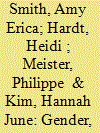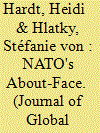|
|
|
Sort Order |
|
|
|
Items / Page
|
|
|
|
|
|
|
| Srl | Item |
| 1 |
ID:
171286


|
|
|
|
|
| Summary/Abstract |
Numerous studies document female scholars’ underrepresentation in political science publications and citations, yet few examine graduate syllabi. In this study, we assess the impact of instructors’ individual characteristics (i.e., race, gender, and age) on which readings they assign. We use what is—to our knowledge—the largest dataset of graduate readings to date: the GRaduate Assignments DataSet (GRADS), with 75,601 readings from 840 syllabi in 94 US PhD programs. We report several findings. First, overall, instructors infrequently assign female-authored scholarship relative to the rates at which women publish. Second, instructors who are women, people of color, and those from more gender-equal countries assign significantly more female-authored readings than white male instructors and those from less gender-equal countries. Third, among women—but not men—older instructors assign more female-authored work. We suggest that women’s underrepresentation on syllabi may contribute to “the leaky pipeline,” which describes women’s attrition from academic careers.
|
|
|
|
|
|
|
|
|
|
|
|
|
|
|
|
| 2 |
ID:
151393


|
|
|
|
|
| Summary/Abstract |
This article introduces an argument for how institutional memory of crisis management operations develops in North Atlantic Treaty Organization (NATO). Scholars of European security and of international organisations have examined organisational learning, but have yet to explain its precondition: institutional memory. In a context of increasing turnover due to defence budget cuts, it remains unclear how shared knowledge of strategic errors is acquired. This article finds that the NATO secretariat facilitates practitioners’ use of informal processes for contributing to institutional memory in response to the constraints of existing formal learning processes. These formal processes, including a lessons learned centre and a lessons learned database, inadvertently disincentivise practitioners from contributing such knowledge as using them can incur reputational costs. Drawing on NATO documentation and interviews with 27 NATO elite practitioners, the paper provides evidence that practitioners instead share knowledge through three informal processes: interpersonal communications, private documentation and crisis simulations.
|
|
|
|
|
|
|
|
|
|
|
|
|
|
|
|
| 3 |
ID:
122303


|
|
|
|
|
| Publication |
2013.
|
| Summary/Abstract |
The speed with which international organizations establish peace operations impacts prospects for sustainable peace. This article explains why some organizations take longer than others to answer calls for intervention. It identifies the role of informal relations in a literature that has long favored formality and challenges realist assumptions that intergovernmental decisionmaking depends strictly on national interests. Based on personal interviews with fifty ambassadors at four regional organizations, the article shows that differences in response rates largely depend on the strength of interpersonal relations among decisionmakers. Despite having superior funding, the European Union remains the slowest organization to react because of its highly formalistic culture. Informal bonds of trust help account for the speed with which organizations are able to respond to crises.
|
|
|
|
|
|
|
|
|
|
|
|
|
|
|
|
| 4 |
ID:
171807


|
|
|
|
|
| Summary/Abstract |
Scholars in global security studies have only recently focused attention on how and why international security organizations (ISOs) adapt. Since the United Nations Security Council's issuance of Resolution 1325, some ISOs have enacted changes to implement gender mainstreaming. The concept involves incorporating gender-based analyses in policy and planning and increasing women's representation. Drawing on interviews with seventy-one elites and a dataset of ninety-seven NATO gender guidelines, this article introduces an original argument for why NATO adapted to gender mainstreaming. Such adaptation is surprising given the military's historical resistance to gender considerations and that civilian bodies typically enact reforms. Findings indicate that other ISOs were substantially influential in the process and that institutional incentives built into NATO's military bodies drove military officials to implement mainstreaming in practice. Additionally, military elites perceived a link between gender mainstreaming and operational effectiveness, which further consolidated organization-wide adaptation. This study challenges long-held assumptions about militaries’ resistance to gender-related changes. It also offers one of the first empirical assessments of gender mainstreaming in an ISO.
|
|
|
|
|
|
|
|
|
|
|
|
|
|
|
|
| 5 |
ID:
098419


|
|
|
|
|
| Publication |
2009.
|
| Summary/Abstract |
Scholars have largely overlooked a critical influence on the effectiveness of organizations in their conduct of peace operations: response duration. The consequences of prolonging the time between the demand and supply of a peace operation often include a rise in the death toll on the ground and a fall in the operation's legitimacy in the eyes of the local population. This paper aims to present and explain surprising variation among regional organizations' response rates - a critical influence on operations' prospects for success. The evidence that I have collected shows that despite its relative superior capacity, the European Union responds more slowly than the African Union and other less affluent regional organizations conducting similar peace operations. Applying theories of international organization pathologies, the paper argues that institutional design problems of bureaucratic dysfunction hinder organizations' abilities to rapidly respond.
|
|
|
|
|
|
|
|
|
|
|
|
|
|
|
|
|
|
|
|
|